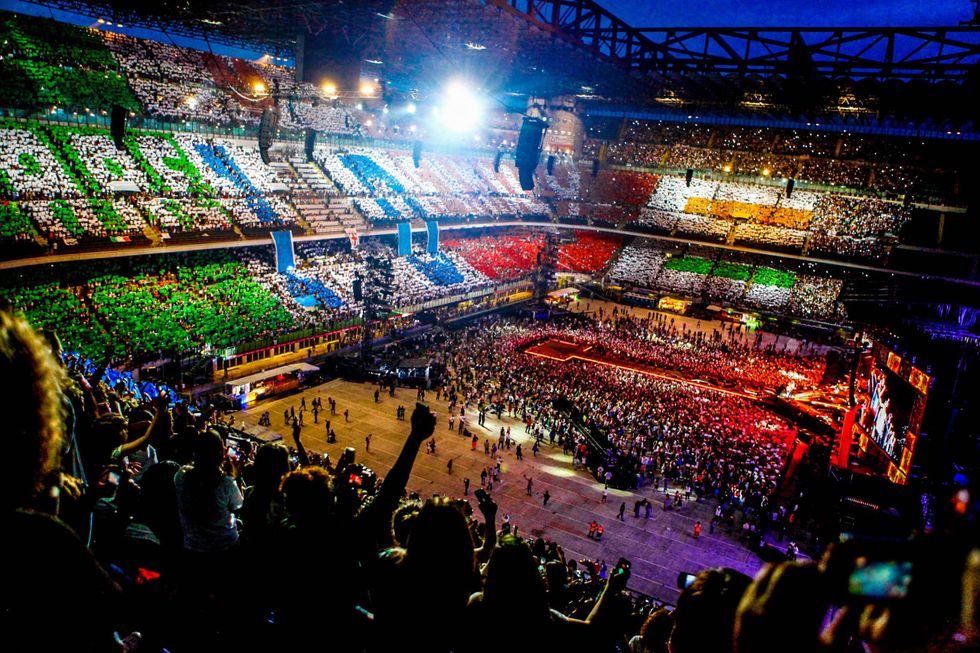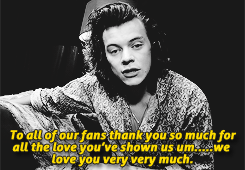“What music do you like to listen to?”
“I like One Direction’s music.”
“Are you another one of those crazy girls who wants to sleep with them?”
I’ve heard it once. I’ve heard it twice. If I had a dollar for every time that I heard it, I would be able to bring One Direction back together for a day so that they could perform at a private venue just for me. “All girls who love One Direction are only interested in them for their looks, and all have the end goal of sleeping with the band members.” You think I’m kidding? Just Google search “One Direction fans” and you will likely get results that talk about how all of their fans are obsessed to unhealthy degrees with them and are devastated when one of them gets a new girlfriend. More than that, though, is the way that the band members are presented not only by the tabloids, but also by their own team, as handpicking girls left and right. Considering that the demographic of the One Direction fandom is largely female — though, ages can range from teens to adult women with families despite what the tabloids will insist — the generalized portrayal of how these girls and young women feel toward the band is not only demoralizing to fans who may be encouraged to listen to the band’s music in more recent years, but is also rooted deeply in misogyny, not to mention a deeper, and less discussed, layer of heterosexism.
Once upon a time, the “problem” with One Direction was that they were a bubblegum pop boy band that no one took seriously and they were described as more of a “brand” than a band. Over the five years that they performed live as a band, their music changed and developed, but their image did not. A winning combination of poor marketing, targeting a limiting demographic and the refusal by their team to discredit the increasing-in-frequency character assassinations — one could say that it is a marvel that they found success at all. I would largely agree, but I would also say that it is down to the devotion of a particular side of the fandom that is frequently discredited and ridiculed not only by the media, but also by those closest to the band members.
As long as there are musicians, there are conspiracies that find a way into fandom life. Some theories have a longer shelf life and are more ridiculous than others, proving to be difficult to shake no matter who says otherwise. For The Beatles, one was that Paul died in 1966 and that the band covered it up. For Michael Jackson, many believe that the artist faked his death so that he could remove himself from the public eye. In more contemporary times, many people in the One Direction fandom believe that the two members, Harry Styles and Louis Tomlinson have maintained a secret relationship for the last seven years, without any public confirmation due to their team’s efforts to keep them closeted. Opinion is split on the matter, but one thing is for certain: those who support the two band members and believe that they are a couple are easily the most devoted members of the fandom. Creating projects such as Project No Control and Project Home that received recognition from the band members and their families, these devoted followers catapulted the songs that the projects were named after onto the charts. To get a sense of the full scale of their efforts, these songs are not singles and the latter one is not even featured on a full album or performed live.
The problem at the forefront is that those around the band treat the young women who follow the band as objects for monetary gain, while simultaneously tearing them down as valueless, vapid fangirls. The thinly veiled misogyny may not be validated by the band who, with the exception of the departed, Zayn Malik, shows nothing but appreciation for all of their fans, but it still exists and regardless of their words stating otherwise, public perception has hardly shifted over the last seven years.
More so, the belief that their fans only help them find success because they are interested in a physical relationship with the band members connects to the idea of heterosexism — the prejudice against homosexuals on the assumption that heterosexuality is the normal sexual orientation. Many fans that keep blogs about the band on social media platforms such as Tumblr identify as some orientation other than heterosexual. Keeping with the belief that fans are only into the band for sexual reasons, their commitment and how they personally identify is devalued to the point where many feel erased and unappreciated for helping the band get to the point where they can pursue solo endeavors during the hiatus.
Boiled down to its most fundamental level, young women who feel deep levels of devotion for a band or musician, and express it in emotional ways are not taken as seriously as men who may do the same for a sports team, or a “respected” musical artist. Perhaps Styles puts it best, though, when in a recent interview with Rolling Stone, he responds to the prompt asking how he feels about many of his fans being young women. A response that has since gone viral, being picked up by multiple news outlets such as, Time, Vogue and Billboard, Styles says:
“Who’s to say that young girls who like pop music — short for popular, right? — have worse musical taste than a 30-year-old hipster guy? That’s not up to you to say. Music is something that’s always changing. There’s no goal posts. Young girls like the Beatles. You gonna tell me they’re not serious? How can you say young girls don’t get it? They’re our future. Our future doctors, lawyers, mothers, presidents, they kind of keep the world going. Teenage-girl fans — they don’t lie. If they like you, they’re there. They don’t act ‘too cool.’ They like you, and they tell you. Which is sick.”


















